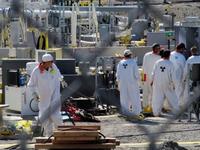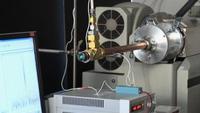-
Water security experts at U Arizona annual conference
How can Arizona secure a safe, sustainable water supply for its current and future residents? The University of Arizona Water Resources Research Center will take on this complex issue at its annual conference on 5 March.
-
-
Much less additional land available for biofuel production
Amid efforts to expand production of biofuels, scientists are reporting new estimates that downgrade the amount of additional land available for growing fuel crops by almost 80 percent.
-
-
Radioactive leaks at Washington’s Hanford nuclear reservation

Earlier this month, Washington Governor Jay Inslee announced that a radioactive waste tank at one of the nation’s most contaminated nuclear sites is leaking, bringing more bad news to Washington’s Hanford nuclear reservation. The 177 tanks at the plant, which hold millions of gallons of highly radioactive waste from plutonium production, are way past their intended 20-year life span.
-
-
Guam uses dead mice to fight snake invasion

Guam has declared war on brown tree snakes, believed to have been carried to Guam around the end of the Second World War. The snakes have become a serious problem, eradicating native bird populations on the island.
-
-
Weather extremes caused by giant waves trapped in the atmosphere
The world has suffered from severe regional weather extremes in recent years, such as the heat wave in the United States in 2011 or the one in Russia 2010, coinciding with the unprecedented Pakistan flood. Behind these devastating individual events there is a common physical cause, propose scientists in a new study. The study suggests that man-made climate change repeatedly disturbs the patterns of atmospheric flow around the globe’s Northern hemisphere through a subtle resonance mechanism.
-
-
Wind power’s contribution has been overestimated

People have often thought that there is no upper bound for wind power — that it is one of the most scalable power sources. After all, gusts and breezes do not seem likely to “run out” on a global scale in the way oil wells might run dry. Yet the latest research in mesoscale atmospheric modeling suggests that the generating capacity of large-scale wind farms has been overestimated.
-
-
Girls perform as well as boys in math competitions
The idea that boys are better at math and in competitions has persisted for a long time, and now we know why: Nobody bothered to schedule the rematch. New study finds that these supposed gender gap is just a product of first-round nerves.
-
-
Georgia wants to redraw its northern border to tap Tennessee River water
Lawmakers in Georgia are renewing efforts to claim Georgia’s right to tap into the Tennessee River’s water supply. The lawmakers hope to achieve this by raising questions about the exact demarcation of the border between the two states.
-
-
Russian fireball largest ever detected by nuke monitoring organization
Infrasound has been used as part of the Comprehensive Nuclear Test Ban Treaty Organization’s (CTBTO) monitoring tools to detect atomic blasts since April 2001 when the first station came online in Germany. Infrasonic waves from the meteor that broke up over Russia’s Ural Mountains last week were the largest ever recorded by the CTBTO’s International Monitoring System.
-
-
Cockroaches gait informs search-and-rescue robot design
More than 70 percent of Earth’s land surface is not navigable by wheeled or tracked vehicles, so legged robots could potentially bridge the gap for ground-based operations like search and rescue and defense. New insights on how cockroaches stabilize could help engineers design steadier robots for operating on difficult terrain.
-
-
Battle-tested technologies no employed by the police
Technologies employed in the wars in Iraq and Afghanistan are now hitting local streets across the United States, changing how local law enforcement investigates crimes by focusing on where crimes are most likely to happen instead of where a crime has taken place.
-
-
Scientists warn of sequestration’s impact on basic research
With less than a week left before sequestration is to take effect, America’s research community has repeated its call for an end to the across-the-board cuts to discretionary spending which will restrict the U.S. ability to invest in the basic scientific research. A coalition of American research and education institutions says that it is this basic research which drives innovation and produces economic growth.
-
-
Climate change as a national security issue
In a new report, Harvard researcher is pointing toward a new reason to worry about the effects of climate change — national security. During the next decade, the report concludes, climate change could have wide-reaching effects on everything from food, water, and energy supplies to critical infrastructure and economic security. “The imminent increase in extreme events will affect water availability, energy use, food distribution, and critical infrastructure — all elements of both domestic and international security,” the report’s author says.
-
-
New explosives vapor detection technology

Novel explosives detection method focuses on direct, real-time vapor detection rather than collection of explosives particles. It could change paradigm for explosives screening.
-
-
Self-healing protective coating for concrete
Scientists are reporting development of what they describe as the first self-healing protective coating for cracks in concrete, the world’s most widely used building material. The coating is inexpensive and environmentally friendly.
-
More headlines
The long view
Encryption Breakthrough Lays Groundwork for Privacy-Preserving AI Models
In an era where data privacy concerns loom large, a new approach in artificial intelligence (AI) could reshape how sensitive information is processed. New AI framework enables secure neural network computation without sacrificing accuracy.
AI-Controlled Fighter Jets May Be Closer Than We Think — and Would Change the Face of Warfare
Could we be on the verge of an era where fighter jets take flight without pilots – and are controlled by artificial intelligence (AI)? US R Adm Michael Donnelly recently said that an upcoming combat jet could be the navy’s last one with a pilot in the cockpit.
The Potential Impact of Seabed Mining on Critical Mineral Supply Chains and Global Geopolitics
The potential emergence of a seabed mining industry has important ramifications for the diversification of critical mineral supply chains, revenues for developing nations with substantial terrestrial mining sectors, and global geopolitics.
AI and the Future of the U.S. Electric Grid
Despite its age, the U.S. electric grid remains one of the great workhorses of modern life. Whether it can maintain that performance over the next few years may determine how well the U.S. competes in an AI-driven world.
Using Liquid Air for Grid-Scale Energy Storage
New research finds liquid air energy storage could be the lowest-cost option for ensuring a continuous power supply on a future grid dominated by carbon-free but intermittent sources of electricity.
Enhanced Geothermal Systems: A Promising Source of Round-the-Clock Energy
With its capacity to provide 24/7 power, many are warming up to the prospect of geothermal energy. Scientists are currently working to advance human-made reservoirs in Earth’s deep subsurface to stimulate the activity that exists within natural geothermal systems.
